New approaches in work pmpk. The role of PMDK in the organization and support of the educational process
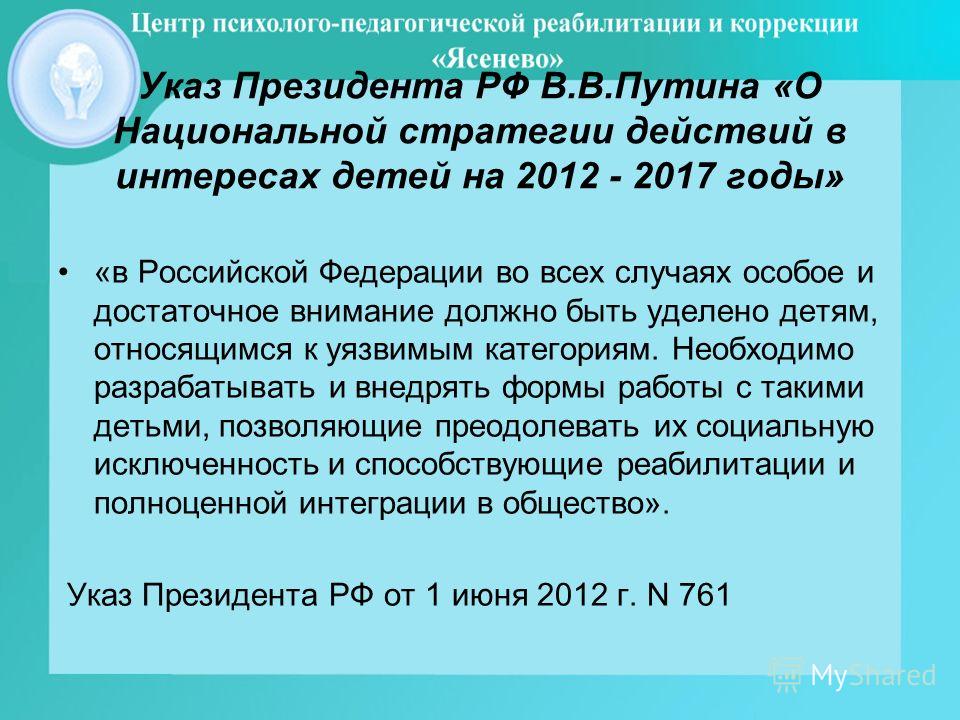
Lecture on the topic: Organizational models of the PMPK activities in modern conditions
1. ORGANIZATIONAL MODELS OF ACTIVITY OF PMPK IN MODERN CONDITIONS
Target settings
The main social goal of PMPK activities is to help children and their parents to cope with difficulties while living under normal conditions in the environment of their loved ones.
PMPK should confirm the right of a particular child to special care, and with it the additional funds that the state should allocate to create special conditions for the child to receive education.
This goal requires reorienting the activities of PMPC specialists to the perception of a child with disabilities and his family as an interested (participating) partner who has not only deficiencies but also strengths in achieving a better quality of life in their chosen environment through the acquisition of skills and the creation of resources.
Changes in the regulatory and legal framework of the education system as a whole, related to the adoption of the federal law of December 29, 2012 No. 273 "On Education in Russian Federation»(Hereinafter - the Law), require specially organized work to ensure the implementation of its key provisions.
So according to Article 5 in the Russian Federation, the right of every person to education is guaranteed regardless of gender, race, nationality, language, origin, property, social and official status, place of residence, attitude to religion, belief, membership in public associations, as well as other circumstances .
In the Russian Federation, the realization of the right of every person to education is ensured by creating by the federal state bodies, state authorities of the constituent entities of the Russian Federation and local governments of the relevant socio-economic conditions for its receipt, expanding the possibilities to meet human needs in receiving education at various levels and directions of life.
In order to realize the right of every person to education by federal state bodies, state authorities of the constituent entities of the Russian Federation and local governments:
1) the necessary conditions are created for receiving, without discrimination, quality education for persons with disabilities, for correcting developmental disorders and social adaptation, providing early correctional care on the basis of special pedagogical approaches and the most suitable languages for these individuals, methods and methods of communication and conditions, to the maximum extent conducive to obtaining a certain level of education and a certain focus, as well as social development these persons, including through the organization of an inclusive education of persons with disabilities;
2) assistance is provided to persons who have shown outstanding abilities and to whom, in accordance with this Federal Law, students who have shown a high level belong intellectual development and creative abilities in a certain area of educational and research activities, in scientific, technical and artistic creativity, in physical culture and sports;
3) financial support is provided in full or in part for the maintenance of persons in need of social support in accordance with the legislation of the Russian Federation during the period of their education.
2. Article 79 of the Law is devoted to the issues of organizing education for students with disabilities:
Article 79 of the Law is devoted to the issues of organizing education for students with disabilities:
The content of education and the conditions for the organization of training and education of students with disabilities are determined by an adapted educational program, and for people with disabilities also in accordance with the individual program of rehabilitation of the disabled.
General education of students with disabilities is carried out in organizations that carry out educational activities according to adapted basic general education programs. In such organizations, special conditions are created for the education of these students.
Under special conditions for education of students with disabilities, this Federal Law refers to the conditions of training, education and development of such students, including the use of special educational programs and methods of training and education, special textbooks, teaching aids and didactic materials, special technical aids for collective and individual use, the provision of the services of an assistant (assistant) providing the students with the necessary technical assistance, conducting group and individual remedial classes, ensuring access to the buildings of organizations engaged in educational activities, and other conditions, without which the development of educational programs for students with disabilities is impossible or difficult.
Education of students with disabilities can be organized both in conjunction with other students, and in individual classes, groups or in individual organizations engaged in educational activities.
Separate organizations carrying out educational activities on adapted basic general educational programs are created by state authorities of the constituent entities of the Russian Federation for the deaf, hard of hearing, late-deaf, blind, visually impaired, with severe speech disorders, mental retardation, mental retardation , with autism spectrum disorders, with complex defects and other students with disabilities.
Features of the organization of educational activities for students with disabilities are determined by the federal executive body that performs the functions of state policy development and legal regulation in the field of education, together with the federal executive body that performs the functions of state policy development and legal regulation in social protection.
Students with disabilities living in an organization engaged in educational activities are fully supported by the state and are provided with food, clothing, footwear, and soft and tough equipment. Other students with disabilities are provided with free two meals.
Vocational training and vocational education of students with disabilities are carried out on the basis of educational programs adapted, if necessary, for the training of these students.
State authorities of the constituent entities of the Russian Federation provide vocational training students with disabilities (with various forms of mental retardation) who do not have basic general or secondary education.
Professional educational organizations and educational organizations higher educationAs well as organizations carrying out educational activities on basic vocational training programs, special conditions should be created for students with disabilities to receive education.
When receiving education for students with disabilities, special textbooks and free textbooks are provided free of charge. tutorials, other educational literature, as well as the services of sign language interpreters and typhoid signal interpreters. This measure of social support is an expenditure obligation of a constituent entity of the Russian Federation with regard to such students, with the exception of students from the budget allocations of the federal budget. For persons with disabilities who study at the expense of the federal budget allocations, the provision of these social support measures is an expenditure obligation of the Russian Federation.
The state represented by the state authorities authorized by it and the state authorities of the constituent entities of the Russian Federation provides training for teachers who have special pedagogical approaches and methods of teaching and educating students with disabilities, and promotes the involvement of such workers in organizations conducting educational activities.
3. In addition, important provisions necessary for the development of the recommendations of the PMPK are contained in Articles 17, 41, 42 of the Law and other articles.
In addition, important provisions necessary for the development of the recommendations of the PMPC are contained in Articles 17, 41, 42 of the Law and other articles.
The organization of PMPK activities involves active interaction with educational institutions, ITU, health care, various social and public services. Specialists of PMPK are positioned as specialists of resource centers for the development of inclusive education, which contributes to the rejection of the “medical”, “defectological” model of the perception of the child’s difficulties.
Public parent organizations one of the main problems in the organization of PMPK activities is the formality of the survey. Employees of PMPK deal with children whom they see for the first time. However, the members of the commission usually fail to establish emotional contact with the child, or they simply do not try to interact with it. In addition, the conclusion often takes into account only the characteristics and recommendations of state educational institutions in which children are involved. Often the characteristics contain only an enumeration of what the child cannot and does not do compared to peers.
What should change in the organization of the commissions?
1. Approach to the understanding of general education - education for all, including inclusive, integrated, special (correctional) education technologies
2. Strengthening the advisory and supporting role of the PMPK, providing for the possibility of long-term dynamic examination and repeated counseling of parents (legal representatives) and teachers on issues of further supporting the child and implementing recommendations.
3. The emergence of public professional expertise of the PMPK through feedback from customers and experts.
4. Organizational models
Organizational models
The main condition for increasing the objectivity of the PMPK survey is:
1. Consideration of the characteristics of all professionals working with the child.
Multidisciplinary, interdisciplinary and transdisciplinary approaches are implemented in the activities of PMPK.
Multidisciplinarity implies the equality of taking into account the opinions of all professionals, teachers, doctors and parents.
Interdisciplinarity implies the need to develop a collective, coordinated decision based on the opinions of all interested parties and a special technology of interaction for its adoption.
Transdisciplinarity involves the study of the situation of circulation in the PMPK at once on several levels, for example, physical and mental, globally and locally. This approach is directly related to the prediction of the formation of development resources and the acquisition of vital competences by a child with disabilities and his family.
2. Documentary evidence of the child's capabilities (products of creative activity, video recordings of classes, events)
3. Compliance with the survey procedure individual features child
Stress due to an unusual procedure, the novelty of the situation, strangers, often tiredness due to waiting, all these circumstances can prevent even an ordinary child from demonstrating himself.
The current provision on PMPK makes it possible to carry out comprehensive diagnostics in conditions that allow an optimal assessment of the child’s development to be made.
Analysis of existing models of PMPK activity allowed us to identify several variants of organizational models of activity depending on the regional (socio-cultural, geographical, personnel specifics):
- “Inpatient” in the premises of PMPK (“long-term” - analytical-advisory and “short-term” - diagnostic and advisory)
- "Exit" ("short-term", "remote"). The premises of the PMPK are located far from the child’s place of residence and imply a long transport journey or it is impossible due to a number of family circumstances.
Moreover, it is necessary to take into account whether the PMPK is a separate organizational structure or it is a structural subdivision of the center of psychological, educational, medical and social assistance, in which the resources of specialists in various fields are consolidated.
In a number of constituent entities of the Russian Federation there is an experience of consolidated work of the central psychological, medical and pedagogical commission with diagnostic and correctional groups of the center of psychological, medical and social support, which allows not only diagnostic procedures, but also to provide correctional and counseling assistance to children and parents.
5. In accordance with part 5 of article 42 of the Law on the center of psychological-pedagogical ...
In accordance with part 5 of article 42 of the Law, the center of psychological and pedagogical, medical and social assistance may be entrusted with the exercise of the functions of a psychological, medical and pedagogical commission, including the conduct of a comprehensive psychological, medical and pedagogical examination of children in order to timely identify features in the physical and psychological (or) mental development and (or) deviations in the behavior of children, preparation of recommendations for providing them with psychological, medical and educational assistance and organizing them about training and education, as well as confirmation, clarification or modification of these recommendations earlier.
1. Passing the PMPK involves the following organizational procedures:
issuing a client's personal card (in case of re-applying the personal card insert) with a statement about the consent of the parent or legal representative to undergo diagnostic procedures at the center of psychological, medical and social support, as well as consent to the processing of personal data;
analysis of documents (according to the established list) provided by the legal representatives of the child for the passage of the PMPK;
familiarization of the legal representatives of children with the schedule for the passage of diagnostic procedures at the specialists of the center of psychological, medical and social support;
the passage of diagnostic procedures is carried out with the obligatory accompaniment of the child by legal representatives. At this stage, legal representatives are familiarized with the protocols and preliminary results. Allowed to conduct a comprehensive (simultaneous) examination by experts: young children, children with moderate and severe mental retardation.
The purpose of the implementation of diagnostic procedures is:
a) determining the current situation of the child’s development and identifying its limitations and possible development resources;
b) registration of the survey results and preparation of draft recommendations.
2. The basis for the commencement of actions to receive and register documents for the PMPK is the provision of documents by the legal representative of the child. Reception and registration of a written appeal is carried out by the secretary of PMPK. The maximum period for registering a written application should not exceed 1 day from the date of receipt of the application.
3. Upon receipt of documents from the legal representative of the child, the PMPK secretary registers the documents and conducts their examination.
4. According to the results of the examination of documents Secretary PMPK:
a) appoints the date of the PMPK meeting and coordinates it with the legal representative of the child;
b) in case of non-compliance with the provided documentation, issue a notification to the legal representative of the child about the refusal to consider the materials at the PMPK meeting, indicating the reasons for the refusal and recommendations for their elimination.
6. When applying for legal representatives to change the educational route or determine the type of institution for a child ...
When legal representatives declare a change in the educational route or determine the type of institution for a child, special attention is paid to the existing assessments and characteristics from the educational institution. If the documentation provided contains conflicting information, mutually exclusive (for example: positive assessments from the general education program, expert opinion and the diagnosis of a psychiatrist that the child has a mild degree of mental retardation) or deliberately false information, this serves as a ground for refusing to consider data materials at the meeting PMPK on this occasion.
When analyzing documents correlate the following data:
scores by training program,
the diagnosis of a psychiatrist
conclusions of specialists from the educational institution,
characteristics of the educational institution.
Holding PMPK meeting
1. The PMPC meeting is held in accordance with the approved schedule.
2. Specialists of PMPK analyze the results of the passage of preliminary diagnostic procedures, which indicate the current status of the child.
3.Variants of models for holding meetings of the commission are determined by the current state of the child, including the possibility of full communicative contact:
a) Analytical advisory model.
This model assumes that the necessary comprehensive diagnostic procedures have been previously performed with the child. Diagnostic examination was carried out by specialists of the center of psychological, medical and social support within the framework of their professional tasks and competence. At the same time, the structure and content of the conclusion of each specialist meet the professional requirements for diagnosis and were conducted in the presence of the legal representative of the child and were voiced.
The meeting of the psychological-medical-pedagogical commission begins with the clarification of the request to the commission from the legal representatives of the child. Next, a child is invited, the head of PMPK gets acquainted with him and represents a specialist who will conduct a rapid diagnosis using the method of shear studies of the formed basic skills. In this work, the specialist PMPK necessarily fixes the resource capabilities of the child. If necessary, other experts of the commission can be connected to this activity.
Further, PMPK experts speak about the current level of child development (relying, inter alia, on data from preliminary diagnostic procedures), correlating with the possibility of implementing a request designated by a legal representative. This discussion takes place in the presence of the legal representative of the child.
When controversial opinions arise regarding the results of diagnostics, recommendations, and choices of educational needs, compromise decisions are made in favor of the child. We are talking about diagnostic periods of training, treatment, psychological and socio-legal support, dynamic observation by specialists of the Regional Central PMPC in the process of repeated examinations. At this stage, the child is always recommended conditions suggesting a wider “zone of proximal development” corresponding to one (lighter) of differentiable diagnoses.
b) Diagnostic Advisory Model.
Diagnostic-consultative model of the PMPK meeting consists of 2 stages. The first stage consists of a comprehensive examination of the child by the experts of the commission. This stage requires the simultaneous participation of all specialists in the form of supervision. Thus, all members of the commission are observers of the successive stages of examining a child by each of the “planned” specialists. If necessary, this procedure may involve specialists who are not part of the PMPK and have a narrowly focused specialization (for example, a specialist in working with autistic children, etc.). The task of the first stage is: identification of the special educational needs of a child with developmental disabilities.
The second stage is making a decision on the results of a child’s examination. The legal representative clarifies once again the request to the psychological, medical and pedagogical commission. Next, experts speak about the current level of child development (based on data from diagnostic procedures recorded during the first stage of the meeting), correlating with the possibility of implementing a request designated by a legal representative. This discussion takes place in the presence of the legal representative of the child.
When controversial opinions arise regarding the results of diagnostics, recommendations, and choices of educational needs, compromise decisions are made in favor of the child. We are talking about diagnostic periods of study, treatment, psychological and socio-legal support, dynamic observation by PMPC specialists in the process of repeated examinations. At this stage, the child is always recommended conditions that imply a broader “zone of proximal development”, which corresponds to one (lighter) of differentiable diagnoses.
As a result, the child has the opportunity to undergo preliminary diagnostic procedures, this is especially important for children with attention disorders, autism spectrum disorder, cerebroasthenic syndrome, etc. that is, where the risk of a diagnostic error is possible. A parent, accompanying a child, has the opportunity to receive advice on the organization of an accessible environment for a child at home, the features and capabilities of his child from specialists not only of a psychological and pedagogical profile (educational psychologist, teacher-speech pathologist, speech therapist), but also from child neurologist, psychiatrist, pediatrician. And often, in the process of understanding the situation of developing your own child, the parent changes the initial motivation from the external (I was sent: teachers, educators, etc.) to the internal (it is important for me to know, in order to help the child). Sometimes parents themselves additionally sign up for an appointment with a psychologist in order to look at the intrafamily situation in which, of course, a child with disabilities is included, to understand possible options for social algorithms and prospects for their child.
After conducting diagnostic procedures, specialists develop recommendations for the child, which allow parents to carry out various actions aimed at the development of the child. Based on these recommendations based on the results of preliminary diagnostic and consultative procedures, the child, together with the legal representative, comes to the meeting of the psychological, medical and pedagogical commission. The work of the commission in this case can be presented as an analytical-advisory model for the development of possible options for including a child in the educational space.
According to the results of the PMPK meeting, you can offer to fill out a questionnaire, but not in the presence of PMPC specialists, but when they leave the commission and there is an opportunity to reflect on what happened. On the one hand, questionnaire questions orient parents to internal acceptance of the situation; on the other hand, they can provide feedback on the quality of the commission’s work as a whole, analyze their impressions and feel that PMPC specialists are not only interested in the formal quality of their work, but also in their actual use by parents their recommendations.
For example:
How do you understand the decision of the commission?
completely understandable _____ basically understandable _____ basically incomprehensible _____
completely incomprehensible ______
high _______ medium low _______ (why) _________________________________________________
high _______ average ______ low _______ (why) _________________________________________________
How do you plan to use the recommendations of the commission:
I will follow them completely ________ I will follow partially __________ (specify in which part and why)
I will not _______ (why) _______________________________
What suggestions could you make to the work of the commission as a whole, or on its individual elements ________________________________________________
How did the work of the commission help you and your child?
Significant role in the creation of an inclusive education system belongs to the psychological, medical and pedagogical consultations, which are primary and liaison between common organizations and special education on the inclusion of children with disabilities in the general educational process.The State Program defines two main directions for the development of inclusive education in the countryin the implementation of which active participation should take territorial PMPK.
First direction - this is the identification of violations of the psychophysical development of children and the organization of correctional and pedagogical work on as early as possible (aged 0 to 3). Worldwide, the education of children with disabilities is deployed in the direction of early intervention as the most humane, cost-effective and resource-saving pedagogical technology. Rendering early correctional and pedagogical assistance allows reducing the number of children with disabilities to 30% by school age.
And here, undoubtedly, the leading role belongs to PMPK. Although a significant problem arises - the very organization of correctional and developmental education for young children, since there are not enough psychological and pedagogical correctional offices and speech centers in the area where children from 0 to 3 years old are given help.
Second direction
-
inclusion of children with disabilities in
general education process by creating a barrier-free environment for them,
varying conditions of training and education, taking into account their psychophysical features.
In this regard, have changed main functions of PMPK,means and commission purpose today - not to recruit special correctional classes and groups, but to prepare recommendations for assisting and defining special conditions for teaching a child with disabilities, choosing the best route, selecting and describing conditions for adaptation within this route.
At the same time stand out new tasks of PMPKrelated directly to the experience of inclusive practice:
Assessment of the possibility at the present stage of development (the state of the child) to be included in an educational institution of inclusive type;
The choice of the form of inclusive education: in PPMS-Center, structural subdivision of pre-school, inclusive school of secondary school, diagnostic class of secondary school, home school, institution additional education etc.;
Choosing the optimal level of inclusion in the environment of ordinary peers - partial integration, full integration, integration within the framework of additional education, etc.
Determining the conditions for the inclusion of a particular child in the environment of ordinary peers;
Determination of the period, including diagnostic, of the child’s stay on one or another form of inclusion in this OS;
assessment of the dynamics of learning and the level of social adaptation in the process of integration of the child in educational institutions (in conjunction with experts PMPK OU);
participation in educational activities aimed at improving the psychological and pedagogical culture and the adoption of inclusive values.
As you can see, now pMPK task It is not only an assessment of the characteristics and level of development of the child, but also a vision of its resources, a vision of its deficiencies and an understanding of the mechanisms of mental disontogenesis. Those. PMPK specialists should design a forecast! In accordance with it, certain conditions for inclusion in training will be prescribed. And this means that the specialists of PMPK themselves should be. polyfunctional (everyone!), have knowledge of defectology, genetics, specials. psychology, developmental neurology, childhood psychopathology, fundamentals of family psychology of a problem child.
The results of the PMPK is to determine the educational route and conditions of stay of the child.
The environment of inclusion: in which institution its division is sent to the child (type of pre-school, recommended group: “Special child” short-term stay group; inclusive group — combined type). For children of school age: type of school - school with inclusive classes or groups; home school; SCOS (diagnostic class); institution of additional education.
The conditions of the child’s stay are determined, and it is clearly written here:
the volume of inclusion: for a few lessons or full inclusion for the whole school week, or in the afternoon, i.e. indicates the degree of integration into the environment of ordinary children;
what is the need for special equipment;
need to be accompanied by a tutor; orientation remedial work escort specialists; recommended mode of employment and counseling; the term for re-referral to PMPK specialists.
Escort specialists themselves are also prescribed: and these are not only specialists working at the Shelter. It is no secret that more and more often children in special education correction programs observed violation of behavior. And without the help of a psychiatrist is not enough. So in the recommendations he should be registered as a mandatory support specialist.
The conditions for successful PMPC activities are the presence of both a formal database of district educational institutions implementing various forms of inclusive education or assistance for children with disabilities, and informal contacts with specialists of these educational institutions, which greatly facilitate the selection of a particular OA for a child. The child should be sent to the institution where the conditions specified in the educational route will be implemented. PMPK specialists directly communicate with inclusive education coordinators at the OS and know about the availability of places in various departments and the specifics of recruiting inclusive groups and classes.
For the effective work of the PMPK, information is needed about health care organizations and social security institutions that implement their programs for working with children with disabilities, as well as data on non-governmental, non-profit organizations and foundations, centers and other organizations. Only in this case, the activity of the PMPC ceases to be formalized and divorced from the real situation, and takes into account the style and experience of each institution, the availability of appropriate resources and allows you to harmonize the process. the inclusion of a child with disabilities in an educational institution.
Decree of the President of the Russian Federation V.V. Putin “On the National Strategy of Action for Children for Years” “in the Russian Federation in all cases special and sufficient attention should be paid to children belonging to vulnerable categories. It is necessary to develop and introduce forms of work with such children, allowing them to overcome social exclusion and promote rehabilitation and full integration into society. ” Presidential Decree of June 1, 2012 N 761

The concept of modernization of Russian education suggests that “children with disabilities (HIA) should be provided with medical and social support and special conditions for learning in comprehensive school at the place of residence, and if there are appropriate medical indications - in special schools and boarding schools. Letter of the Ministry of Education of the Russian Federation of June 27, 2003, 28–51–513 / 16
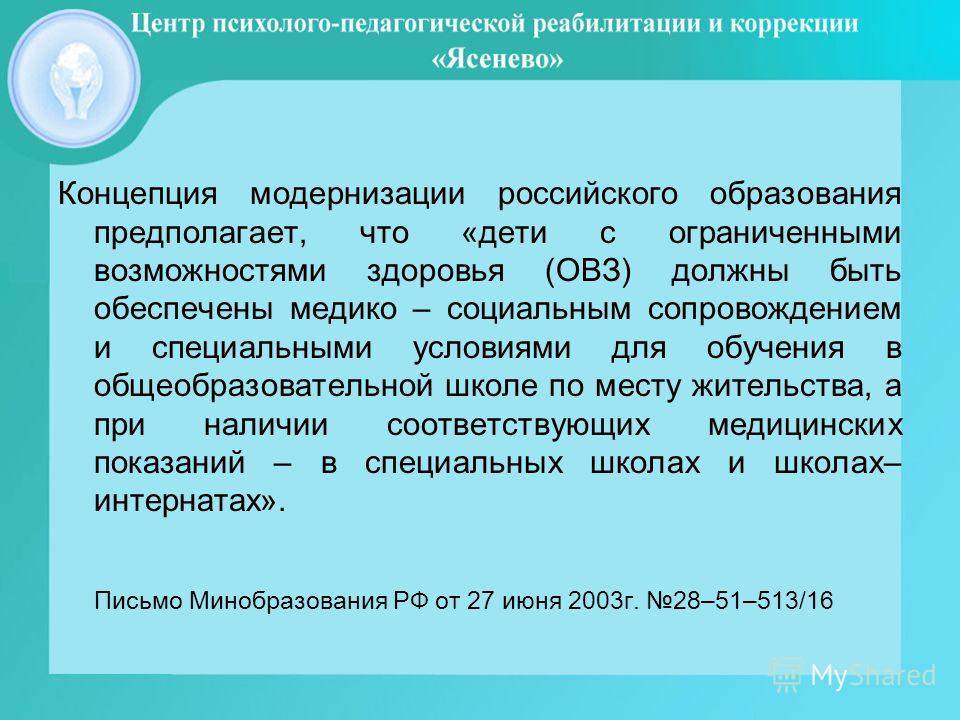
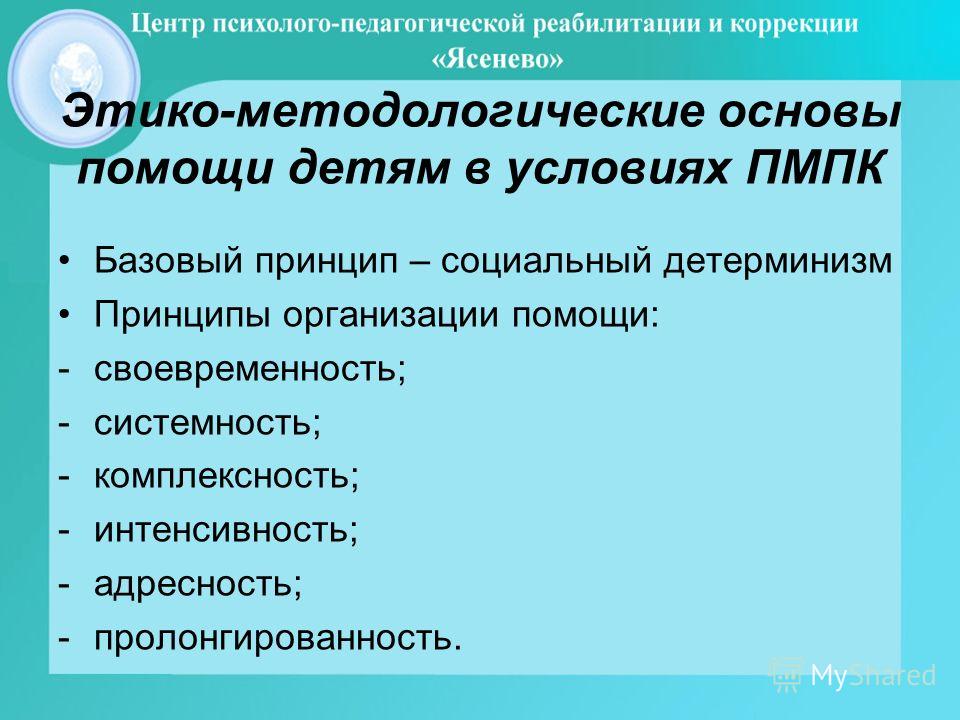
Types of commissions The Central Central Commission is created by the executive authority of the Russian Federation, which exercises state administration in the field of education, and operates within the territory of the Russian Federation. Territorial Created by the executive authority of the subject of the Russian Federation, exercising public administration in the field of education, or by the local government that administers in the field of education, and operates within the territory of one or more municipal entities of the subject of the Russian Federation.
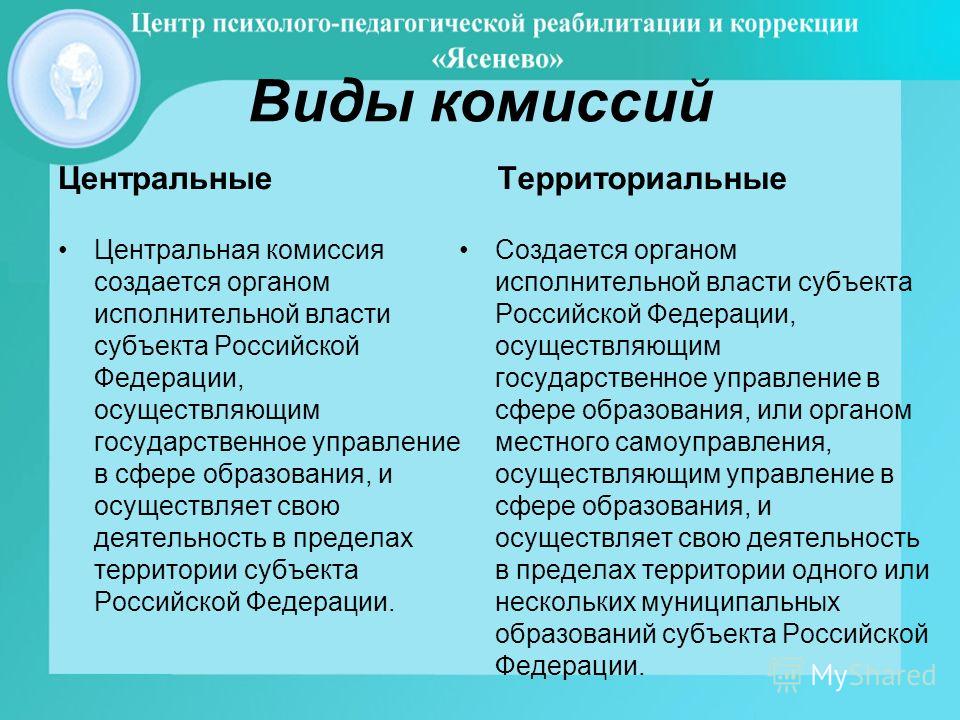
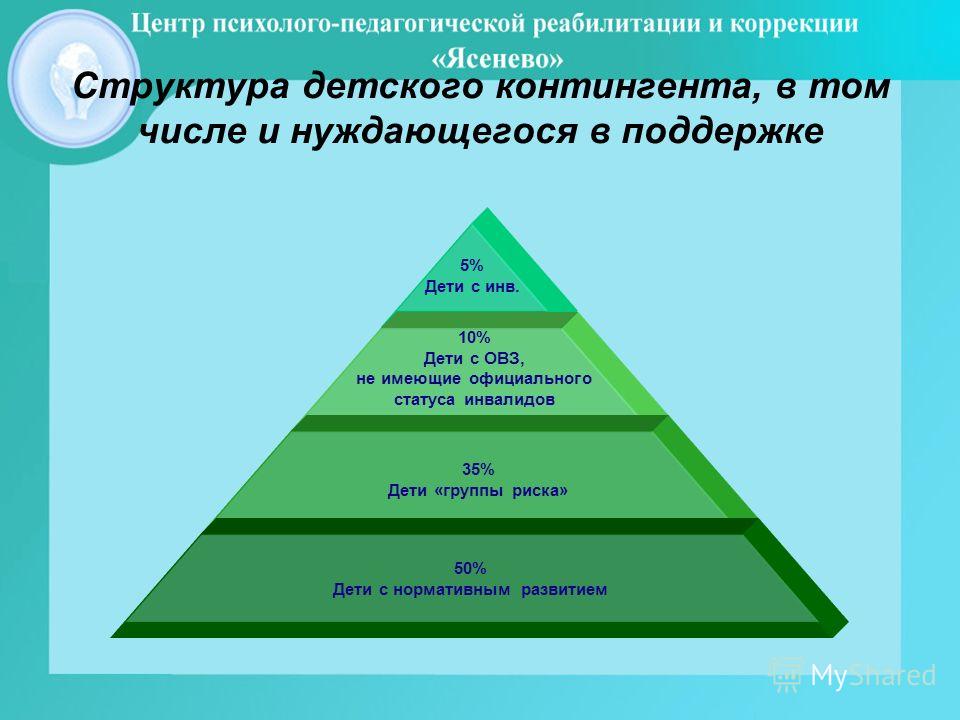
Dynamics of the level of readiness of children 6–7 years of age for systematic schooling based on the results of screening Ye.A. Ekzhanova (Yasenevo district, 2001 / / 13 school years) School year Total children High age norm Stable middle Risk group Extra risk group Problem children (risk groups and extra risk)% 30% 40% 2% 42% 42% 35% 4% 39%% 44% 41% 6% 47%% 44% 33% 6% 39% 40% 39% 6% 45% 42% 30% 6% 36% 40% 34% 9% 43% 37% 38% 9% 47% 38% 39% 8% 47% 40% 37% 8% 45%% 46% 31% 6% 37% 45% 30% 8% 38% 42% 32% 6 % 38%
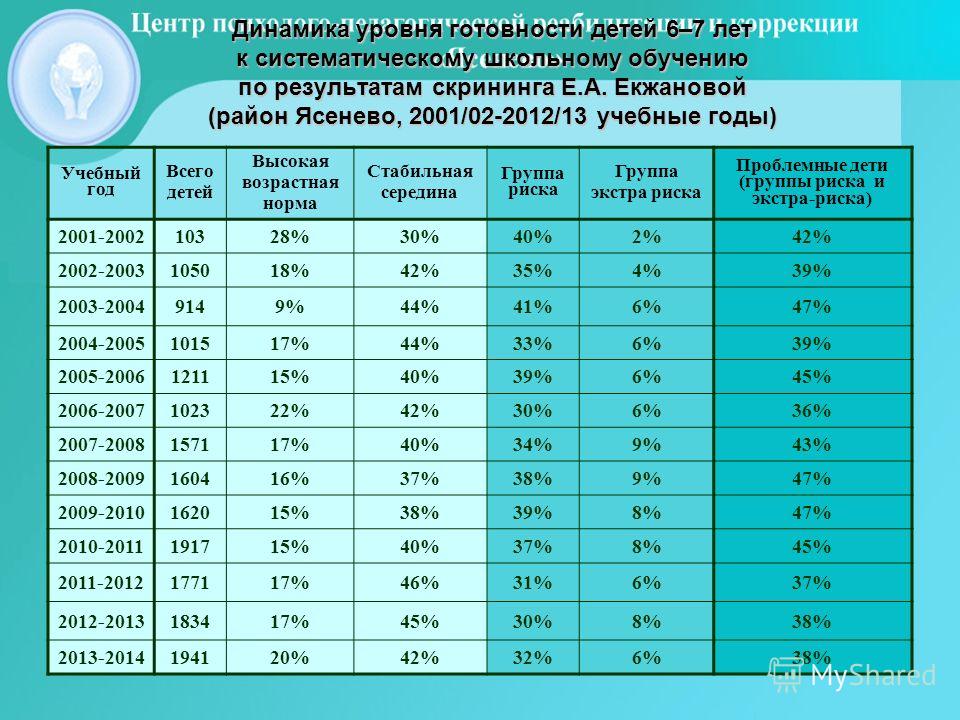
Screening scheme for children 6.5–7.5 years of the Yasenevo district in the academic year Fall 2012 Spring 2013 23 schools 33 pre-school 23 schools 34 pre-school institutions 46 classes 47 groups 46 classes 48 groups 997 people 837 people 958 people 857 people 518 m 479 d 426 m 411 d 484 m 474 d 419 d 438 m 1834 people 1815 people
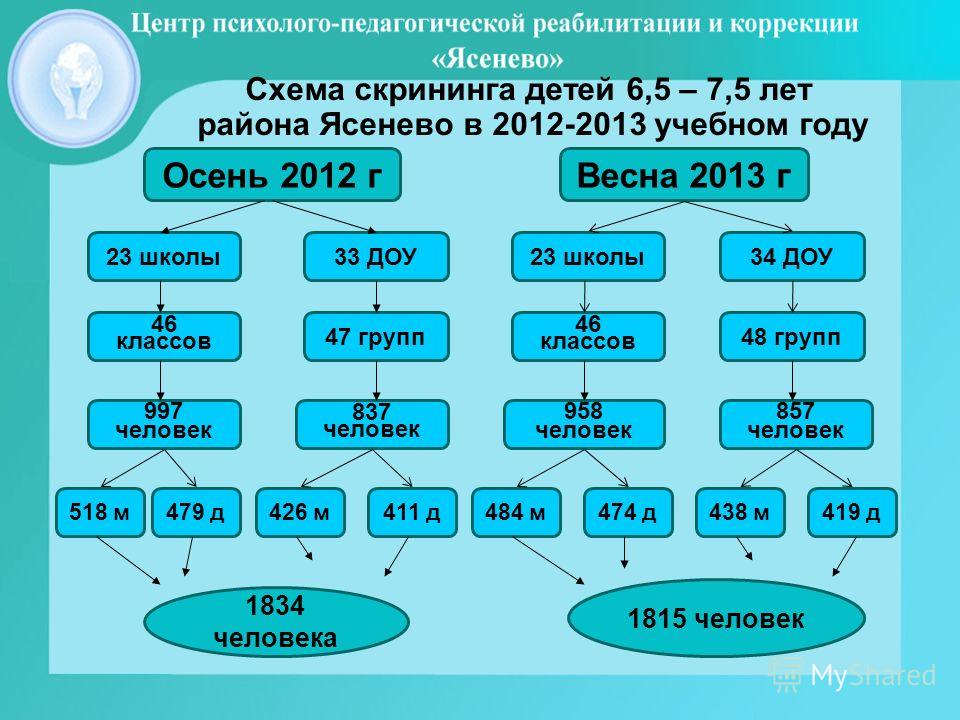
Analysis of gender differences in the psychophysiological readiness for schooling of schoolchildren in the Yasenevo district in the autumn of
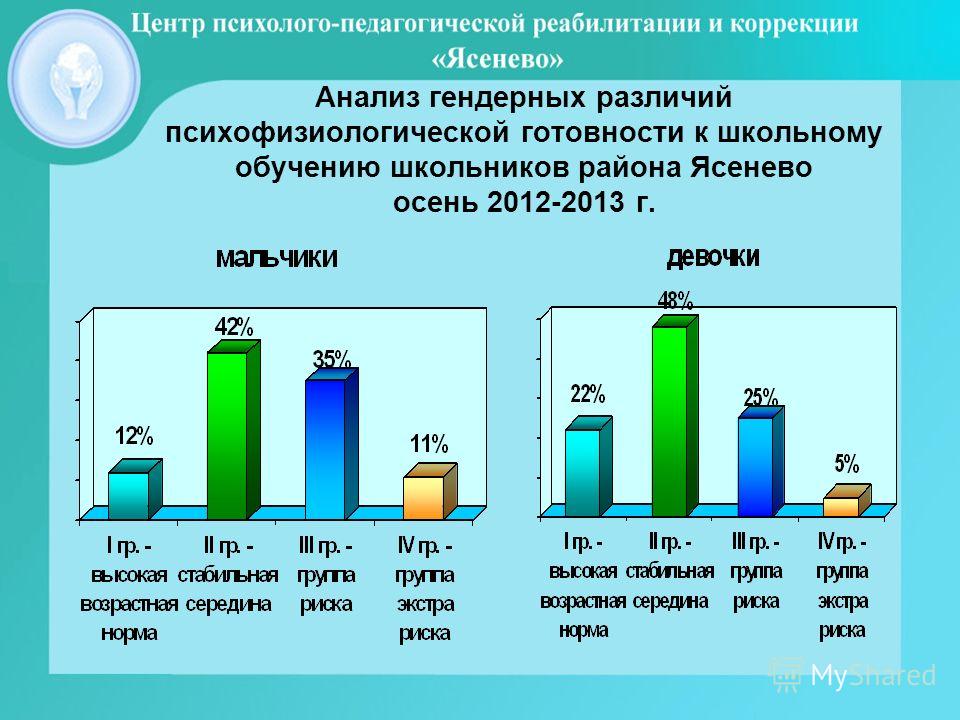
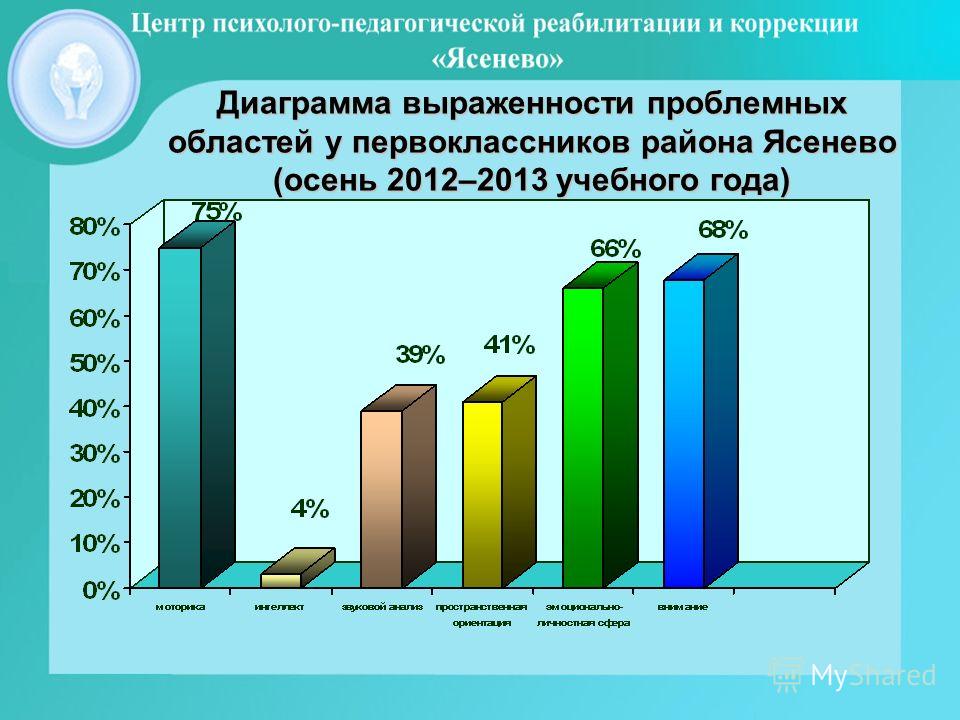
Quantitative indicators of the causes of social maladjustment of children in the 2012/2013 school year (% of the total number of children surveyed) The reason for maladaptation Total children Of them Preschool Schoolchildren, partial inadequacy of the regulatory functions of the emotional - volitional sphere, social and pedagogical neglect, partial lack of cognitive functions 1284 psychoorganic syndrome with exhaustion and inertia of mental processes 1073 difficulties of adaptation associated with the characteristics of the nature of the child 981 decrease slave petitiveness as a result of somatic weakened child 743 hypoplasia cognitive activity 211
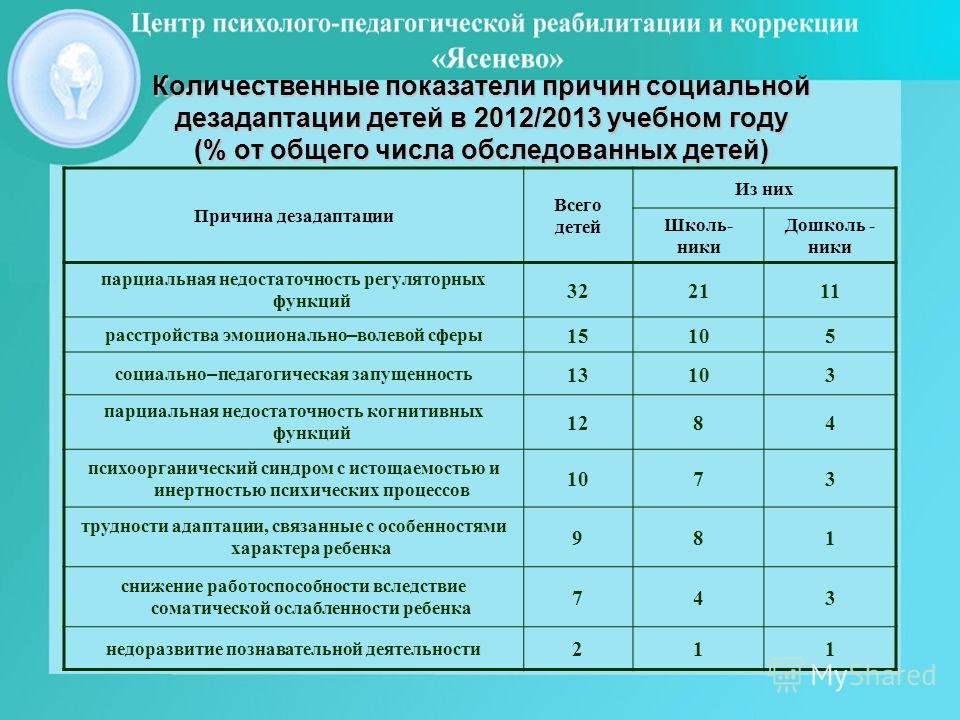
Changes in the contingent S (K) of OS VIII type Quantitative - an increase in classes of children with more severe forms of mental deficiency (children with a lighter degree of mental underdevelopment are trained in classes of AROs of secondary schools). Qualitative - reducing the uniformity of clinical manifestations associated with an increase in the prevalence of oligophrenia due to the effects of endogenous processes, degenerative diseases of the nervous system, toxic, post-traumatic encephalopathy, etc.
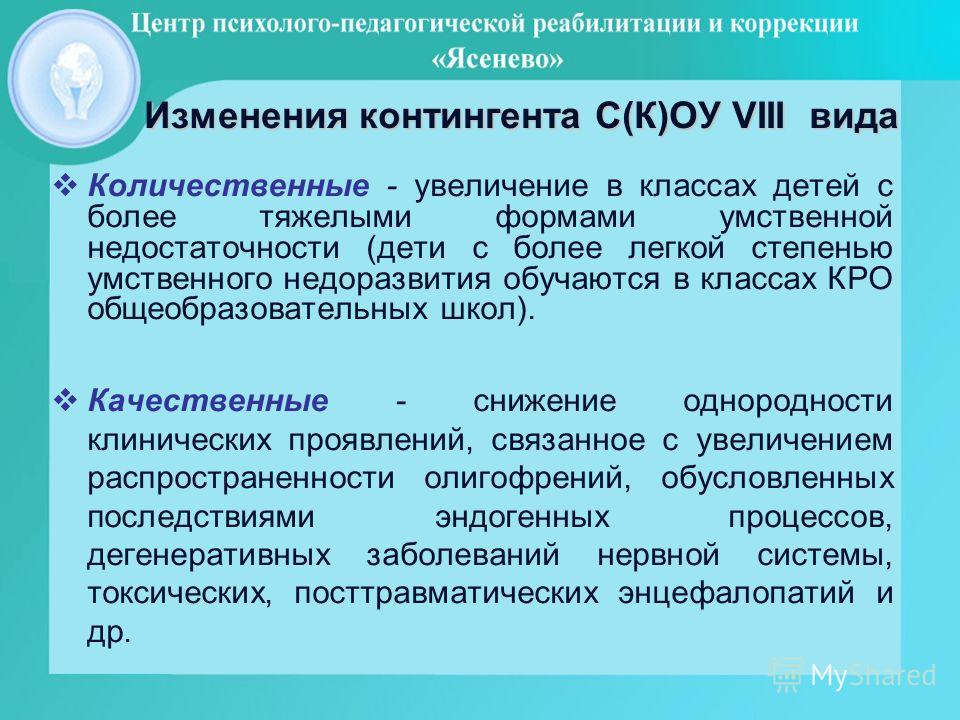
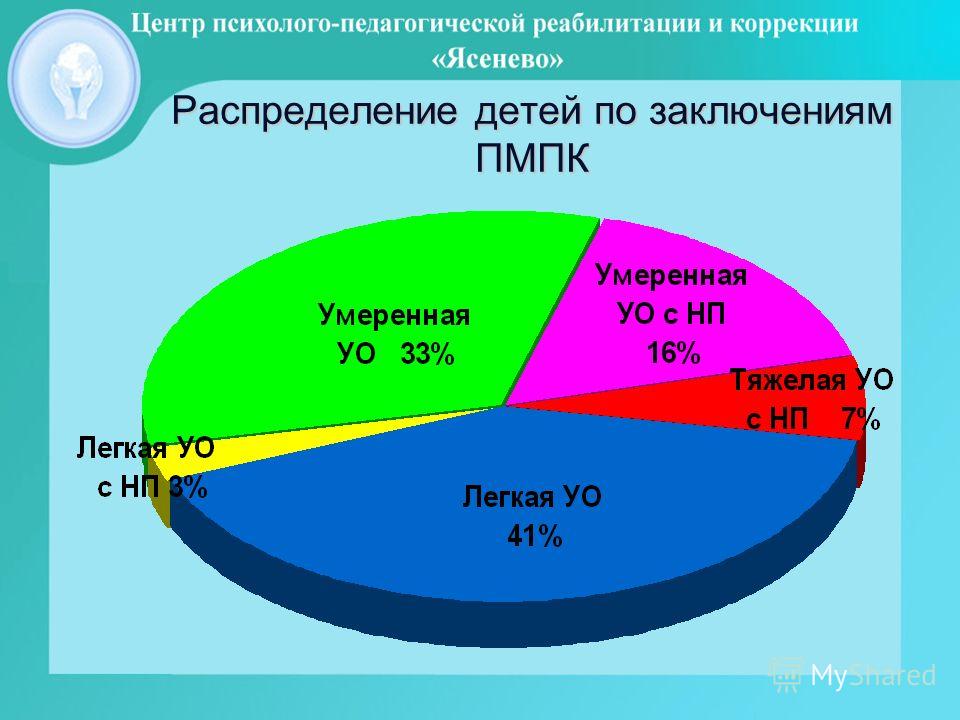
Clinical and physiological classification of UO using D.I. Isaev’s typology (1982) Forms Variants Stenicidal form Balanced Unbalanced Asthenic form Primary Dislastic Dysractic Dismnesic Bradypsychic Disphoric option - Children's schizophrenia
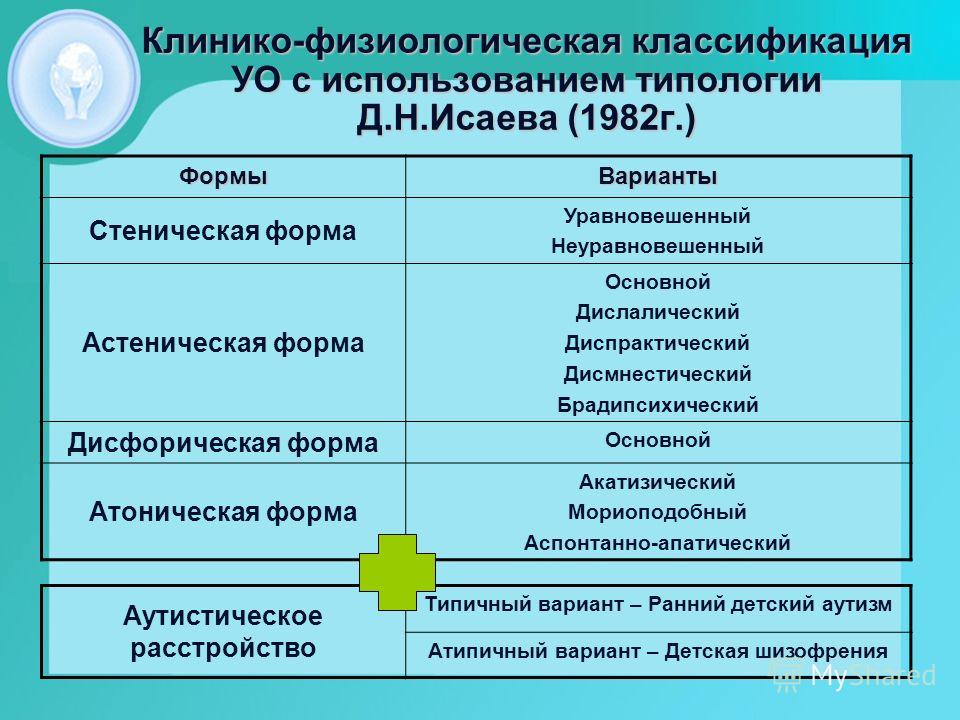
Contact type Sustainable contact Sustainable contact - the child has a craving for communication, liveliness and adequacy of emotions, good nature and tenderness, activity in the classroom and in games, participation in class and extra-curricular activities, friendliness in relations with teachers and other children, ( characteristic of asthenic and sthenic forms of oligophrenia) Unstable contact Unstable contact - intermittent or permanent loss of a child from the sphere of normal communication described above, due to fluctuations in affective tension and abrupt changes in its intensity. Tension manifests itself in states of capriciousness, tearfulness, discontent with all around, frequent complaints, sometimes irritability reaching malice, mild excitability and aggression. Some are experiencing states of intense, absurd, unmotivated euphoria, while children become annoying and “sticky”. The presence of violent emotional discharges, “affective explosions” is also characteristic, while excitement can reach aggressive actions against the environment and oneself (characteristic of a dysphoric form of oligophrenia).
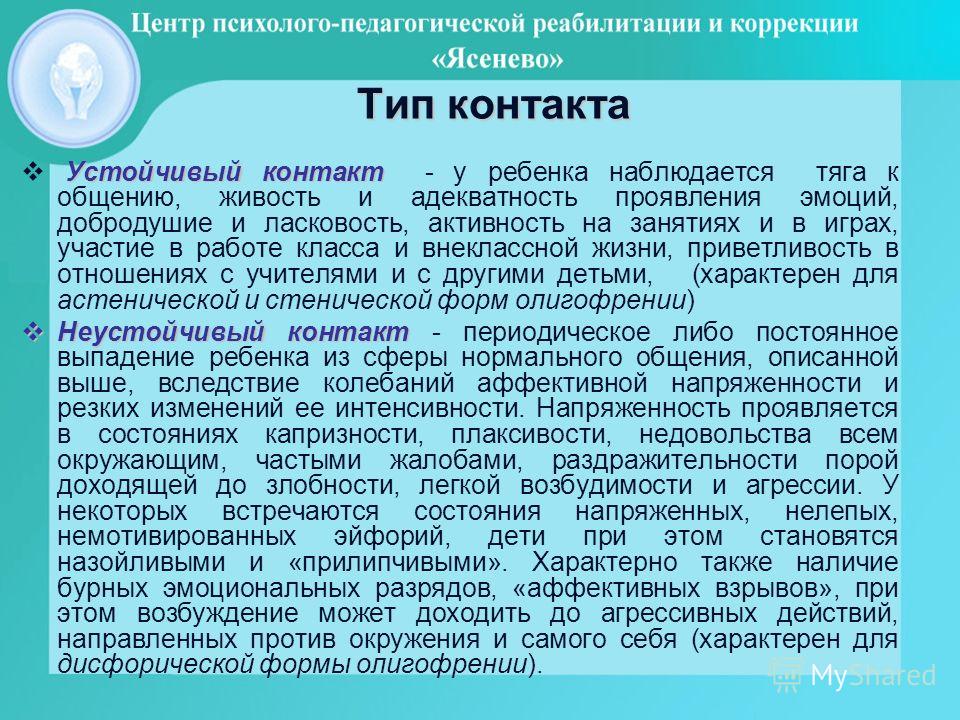
Contact type Impossibility to establish contact Impossibility to establish contact differs from the above described types of contact passive (in the case of the atonic form of oligophrenia) or active (in autistic disorders) by the child's isolation from the surrounding environment. Indifference to external stimuli, the absence of direct eye contact, slipping by the “absent look” on what is happening around, lack of initiative, inactivity or “getting stuck” on stereotypical fuss with some object, low intensity or complete lack of interaction with others are characteristic. Often, such children do not give an answer to the question addressed to them, addressing by name, only repeated, persistent and louder hails, and sometimes even touches force children to react somehow. There are actions that produce the impression of a peculiar and absurd, there is grimacing, unnatural postures, ridiculous questions, untargeted, monotonous, fussy and restless behavior. In the classroom, such a child keeps away from the rest, almost does not participate in the lesson, plays alone in its monotonous games, or may watch other children for a short while.
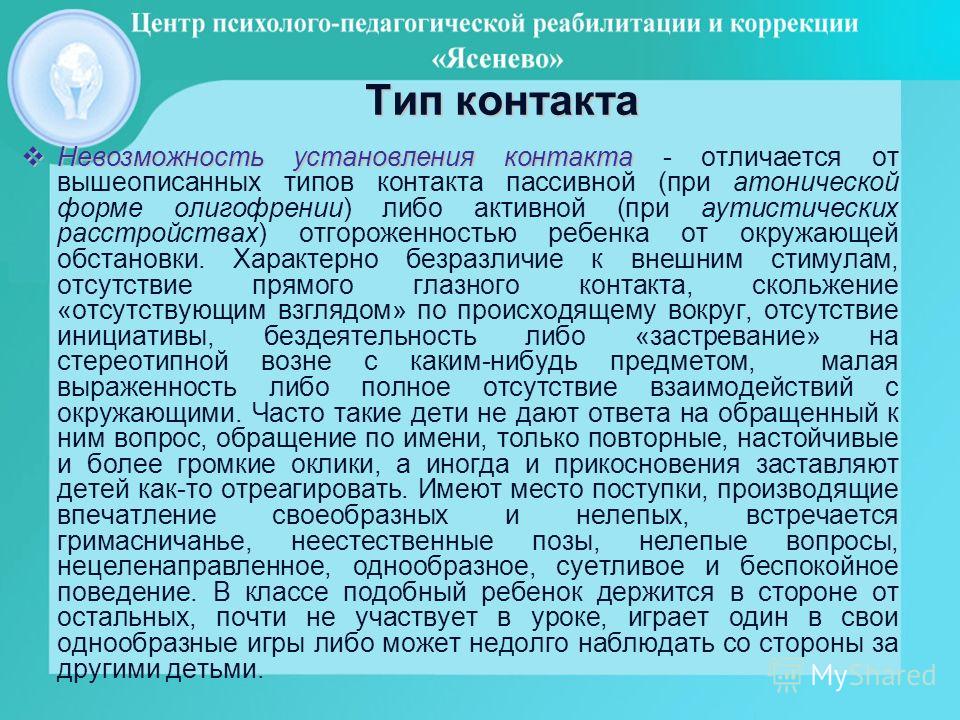
Diagnostic algorithm when it is impossible to establish contact Unable to establish contact passive isolation of a child behavioral stereotypes simple Atonic oligophrenia active isolation of a child behavioral stereotypes complex Autistic disorder XRD Schizophrenia
![]()
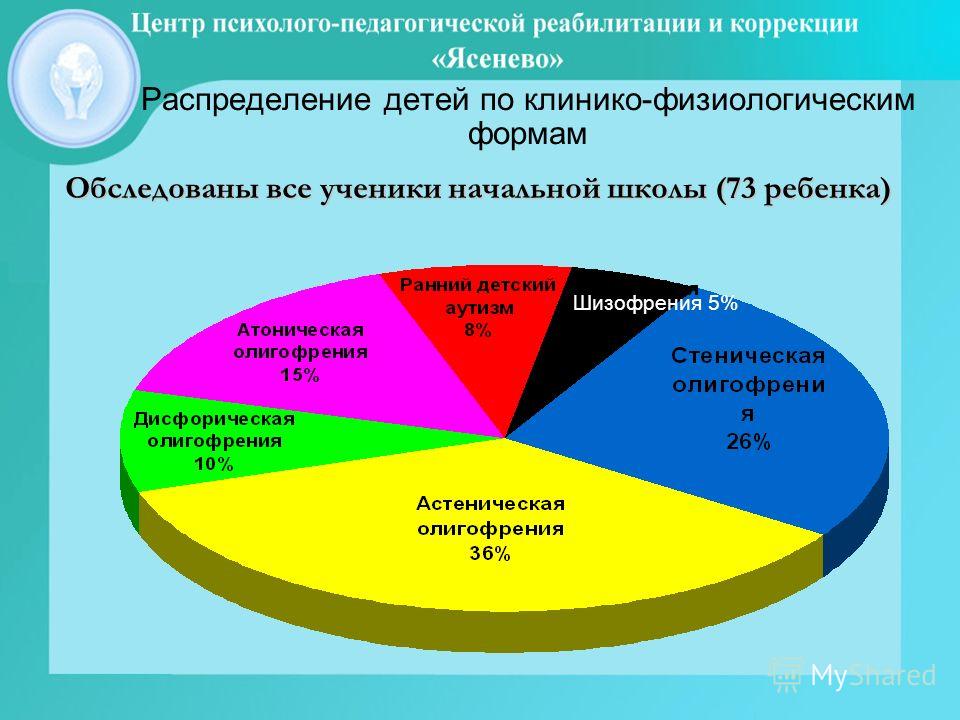
Autistic Disorder Autistic Disorder Autistic disorder, which includes early childhood autism and schizophrenia, is characterized by the impossibility of establishing contact with a child characterized by active isolation from surrounding reality and the presence of complex behavioral stereotypes. By active fenced off means the lack of interest not just to the situation around, namely to the process of communicating with people, associated with immersion in their inner world. In this case, attempts to come into contact with such a child and attract his attention cause active resistance and protest on his part, up to outbreaks of aggression. In contrast to the atonic form of oligophrenia, such children do not suffer from gross attention disorders and are more capable of concentration and volitional effort. This is particularly evident in their complex stereotypical activities, often reminiscent of specific “rituals”, which each child has his own, special and original, complicated with age. *** For comparison *** For comparison, passive isolation, characteristic of the atonic form of oligophrenia, is associated with grossly disturbed attention and inability to concentrate, while persistent attempts by teachers to draw the child’s attention are often crowned with success, and do not cause any resistance from him. parties.
![]()
Recommendations for the teacher Education of the child with RDA must begin with several individual classesduring which contact with the teacher is established and formed. The teacher should try to acquire the status of a “guide and support” of the child in conditions of study with other children unfamiliar to him before. First of all, it is important to find out at what distance you can be from the child, in what voice and in what manner to speak with him, which words and turns should be used, in which way of stimulation to maintain the necessary level of activity, etc., so as not to provoke negative emotional reactions. To this end, it is important to determine the main preferences and interests of such children and the forms of their own autostimulation, after talking with their parents and their immediate environment. You can use homemade toys and familiar objects as didactic materials and materials for study. Since such children are prone to monotonous, stereotypical activities, it is possible to suggest that they focus on a particular task during the lesson. It is important to learn how to track their negative emotional manifestations and not create reasons for their occurrence. It is necessary to create conditions for children to contact other guys and periodically unobtrusively push them towards this communication. It is necessary to monitor the emotional atmosphere around such a child in the classroom, creating a non-conflict environment, to make an attempt to “make friends” with the most calm, emotional and responsive child in the class, for this purpose, children with Down syndrome are often well suited.
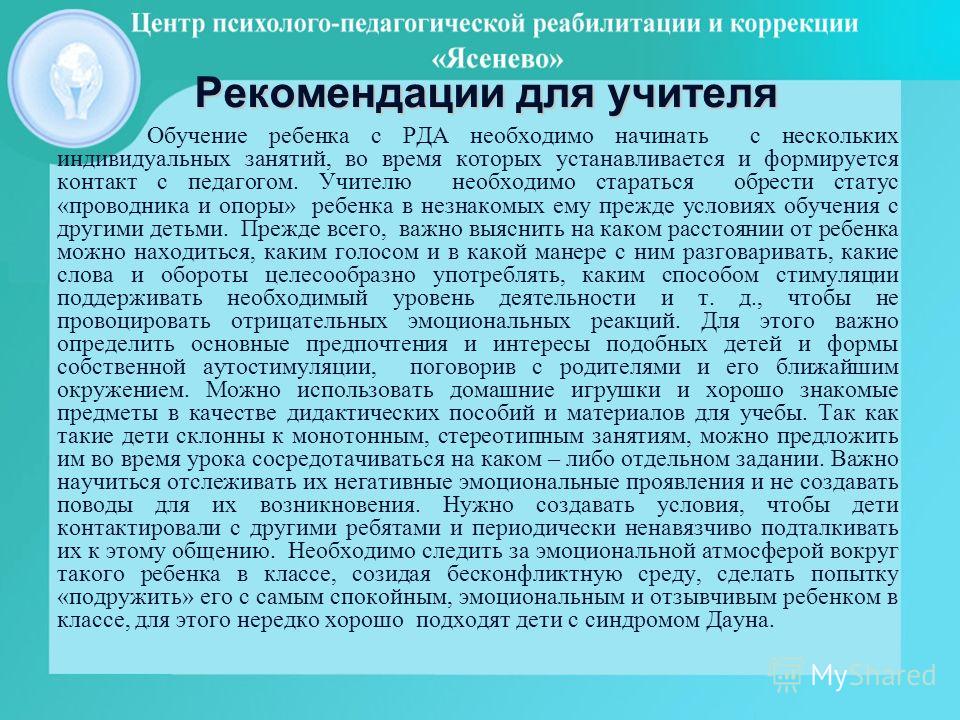
Technology of work with families raising children with disabilities Early detection of children with the effects of PEP and genetic pathology; Complex psychological, medical and pedagogical support for families; Ontogenetic concept and municipal model of social and educational integration; The system of interagency cooperation in defending the rights and interests of the child; Social protection of the family. Cultural - leisure and sports - health rehabilitation of a child in society.
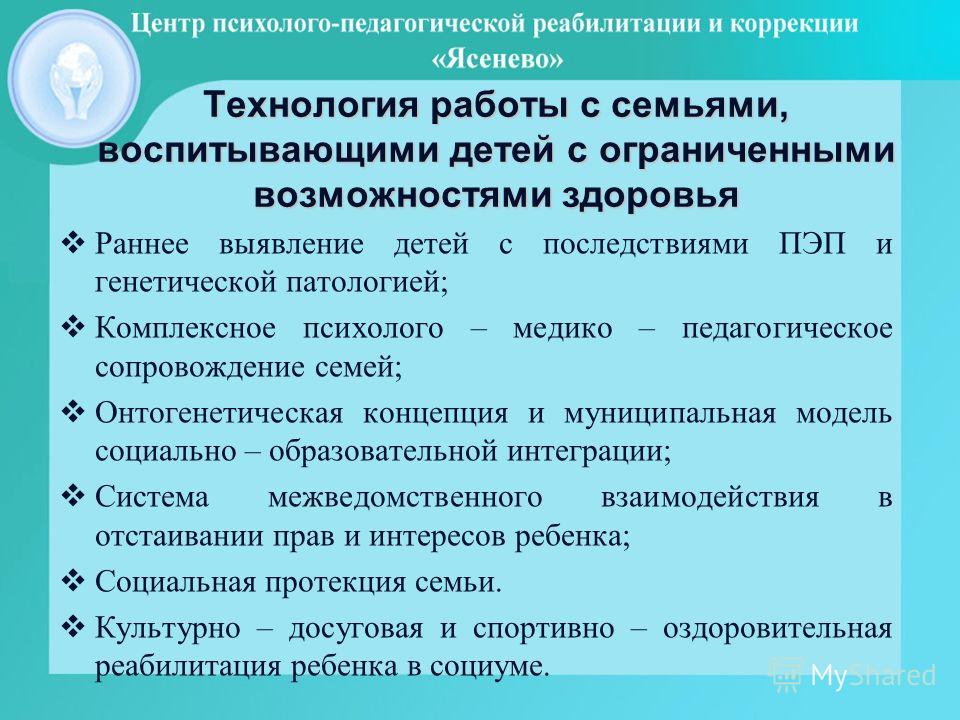
Prospects for improvement psycho-pedagogical support for children in conditions of S (K) OU Establishment of preschool departments. Improvement activities school council and interdisciplinary interaction of its members. Work in society - a network of interaction. Attraction of the coming children's contingent. Improving methodological support. Planning and implementation of experimental activities of specialists. The patronage of post-internatonal adaptation, including the creation of social condominiums.
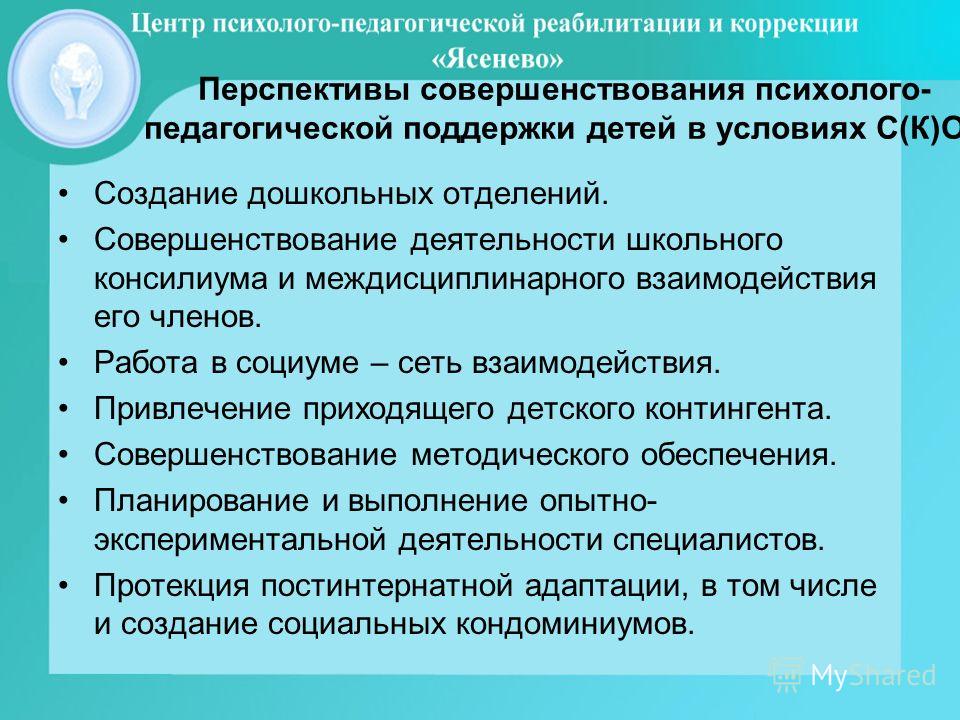
Types of impaired mental development of a child (according to V.V. Lebedinsky) Mental hypoplasia Slow Motion mental development Impaired Mental Development Deficient Mental Development Distorted Mental Development Disharmonic Mental Development
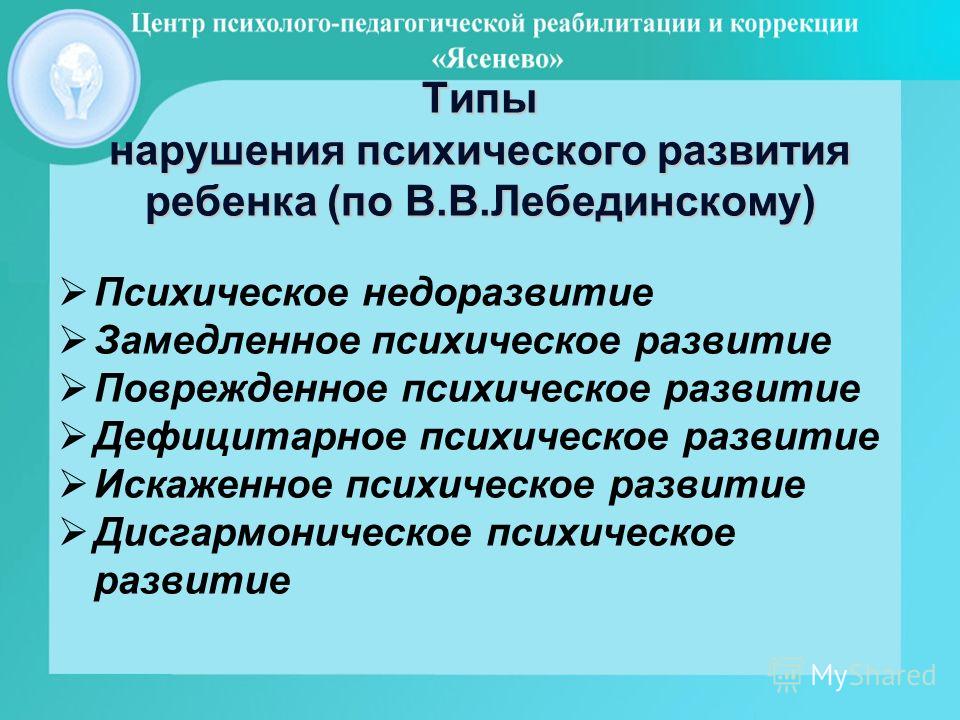
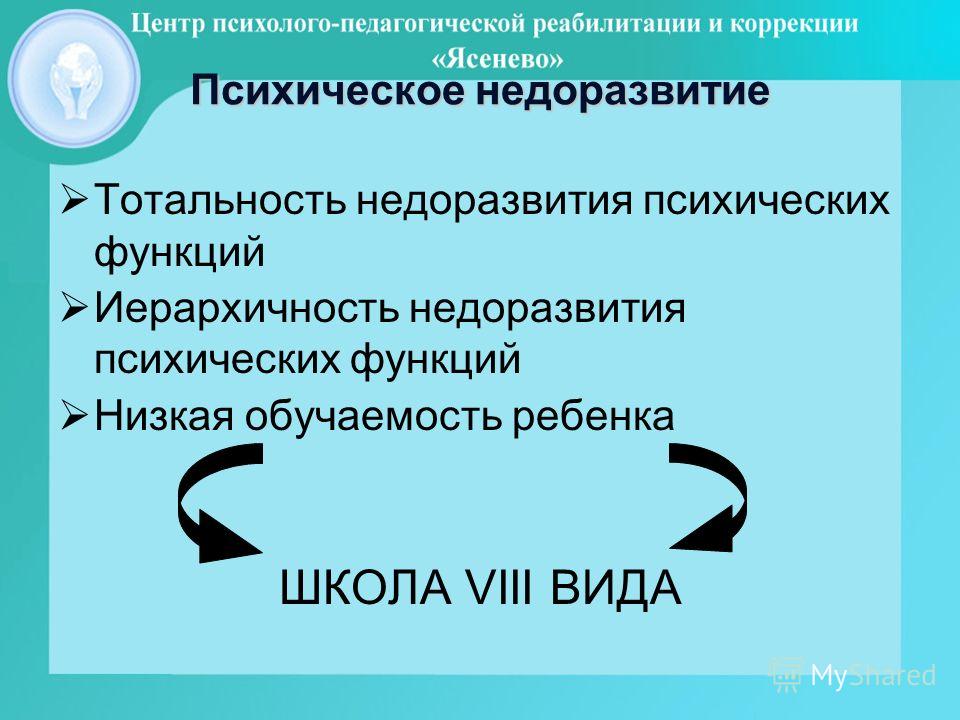
Slow mental development Due to psychophysical infantilism Due to pedagogical neglect Due to somatic weakness Due to organic brain damage Emotional-volitional immaturity Partial failure of regulatory functions Partial failure of cognitive functions Compensating training classes
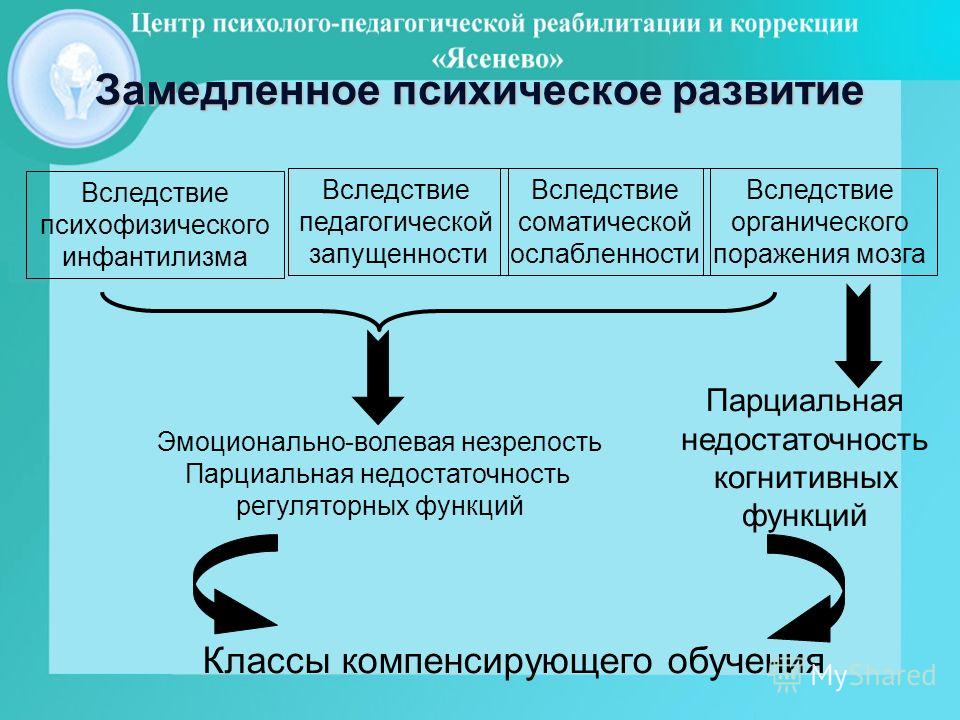
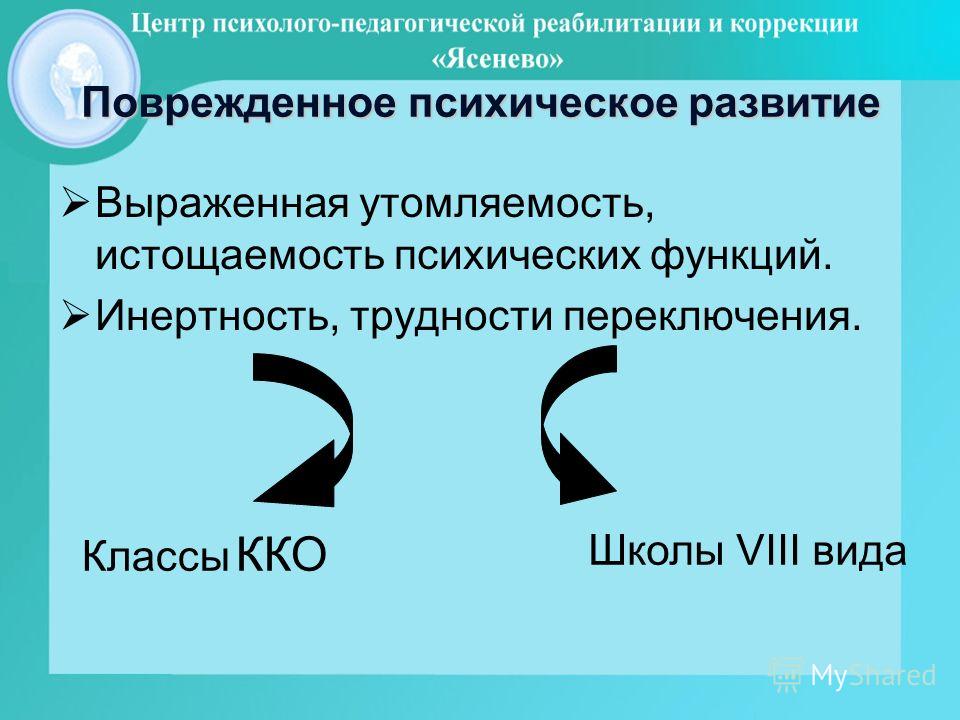
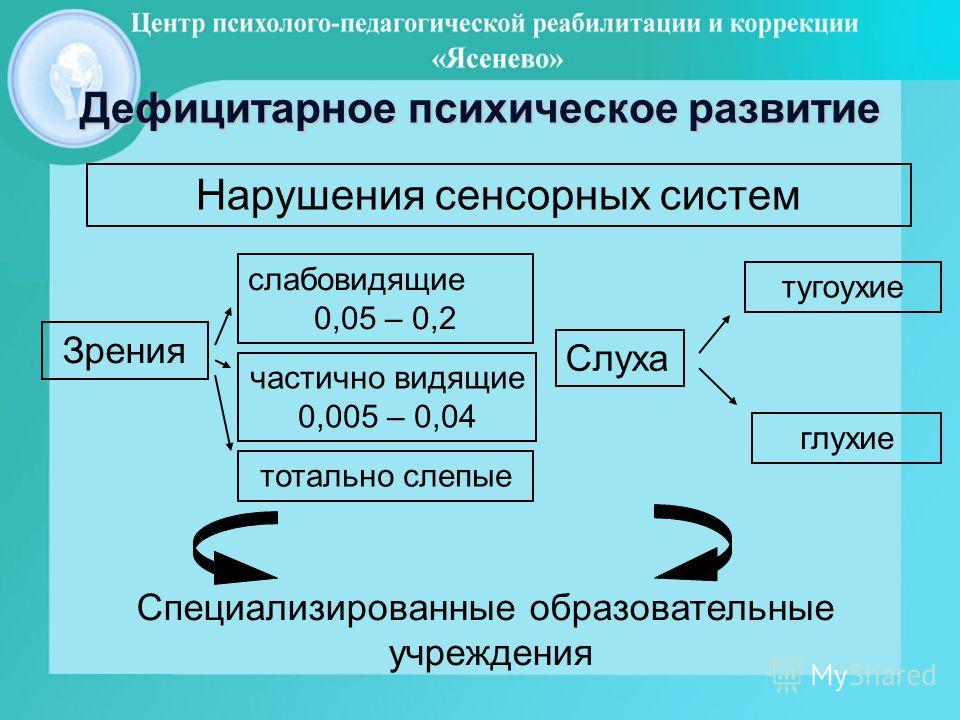
Deficit mental development Children with cerebral palsy Children with consequences of poliomyelitis Children with progressive neuromuscular diseases (myopathy, multiple sclerosis, etc.) Children with congenital or acquired deformities of the musculoskeletal system Disorders of the functions of the motor-motor apparatus Educational institutions Specialized educational institutions
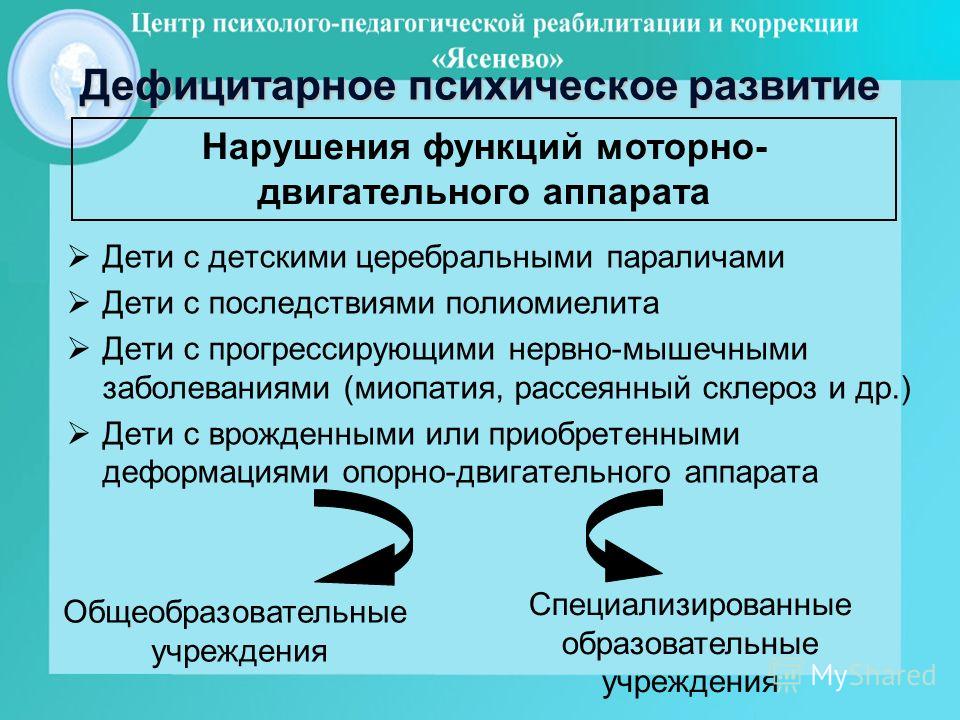
Distorted mental development Complete detachment from what is happening; Active rejection; protesting; Preoccupation with autistic interests; The extreme difficulty of organizing communication, interaction. Educational institutions (individually) Schools VIII view (individually)
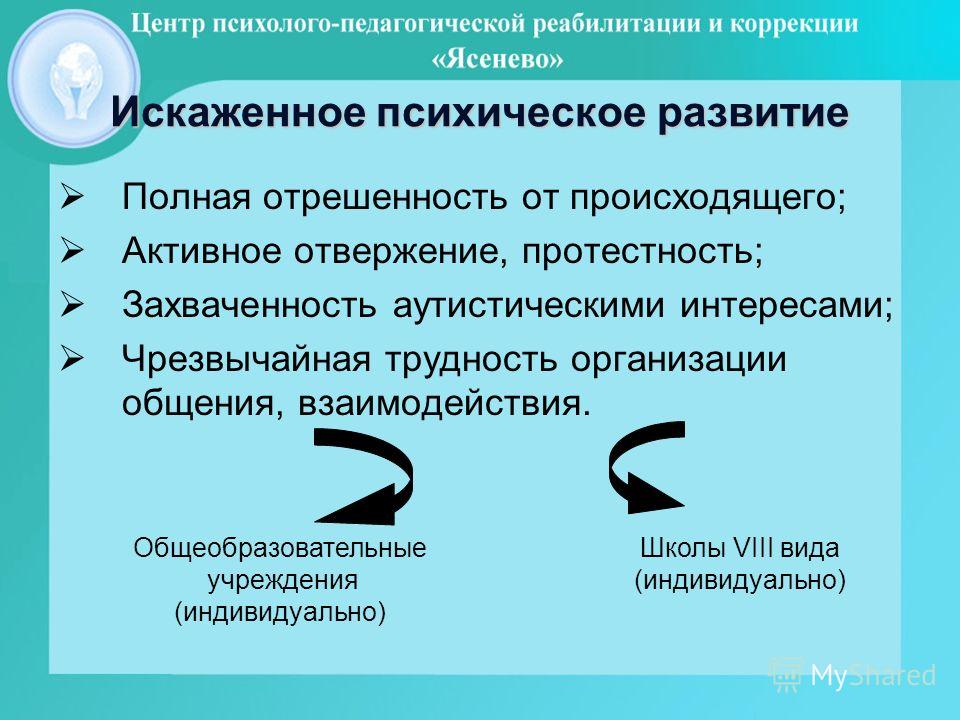
Disharmonic mental development Constitutional psychopathy; Pathological personality formation; Psychopathization in various pathological conditions. General educational and specialized educational institutions (more often individually)
Recommended literature Vilshanskaya A.D. School psychological medical pedagogical council. –Volgograd: Teacher, Yekzhanova E.A., Reznikova E.V. Basics of integrated learning: a manual for universities. - M .: Drofa, Psychological, Medical and Pedagogical Consultation. Guidelines. / Ed. LM Shipitsyna. - SPb .: CHILDHOOD-PRESS, Special Preschool Pedagogy / Ed. E.A. Strebeli. - M .: Academy, Shevchuk L.E., Reznikova E.V. Psychological, medical and pedagogical Consilium in secondary school. - Chelyabinsk, 2010.
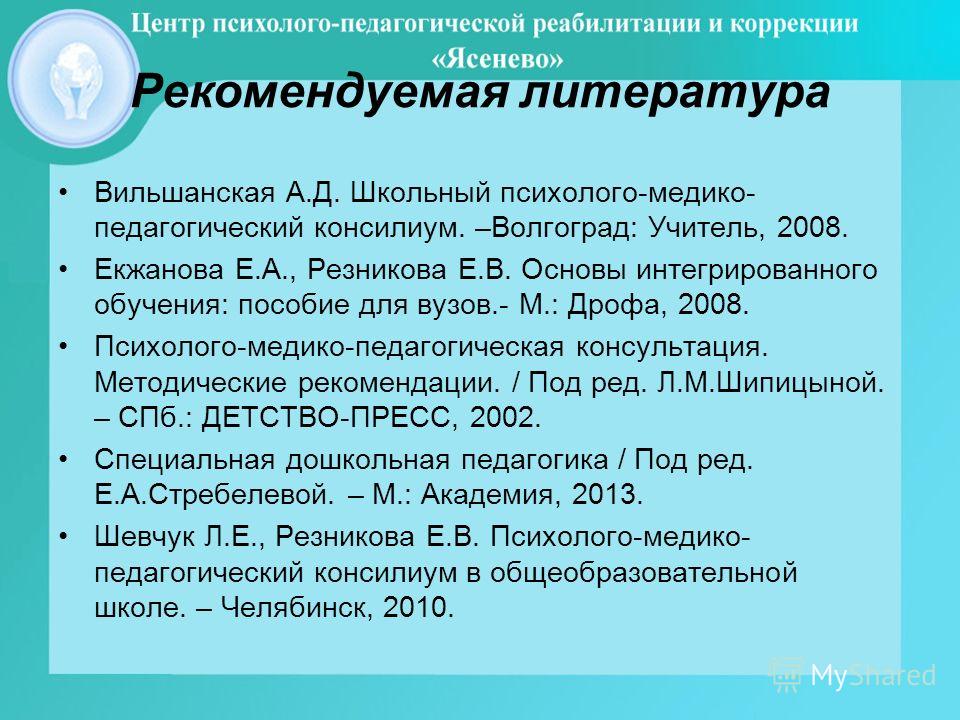
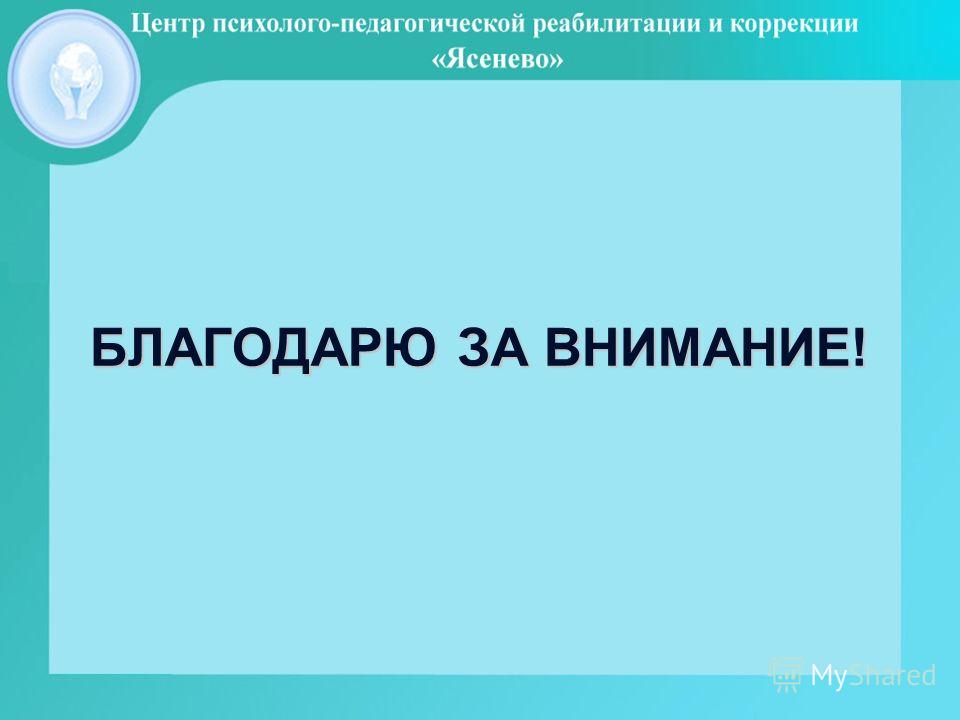
- Riddles for girls on 8
- When on the ship two flags
- Order on the creation of the duty dispatch service
- Historical flags of the states of 1700
- The role-playing game as the main type of games for preschoolers place in the structure of children's games
- Logic Tricks for Adults
- Medical Institute with budget places

 Live journal
Live journal Facebook
Facebook Twitter
Twitter